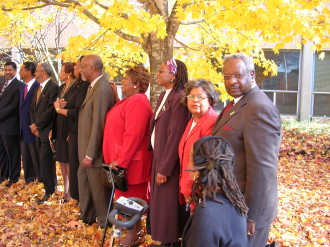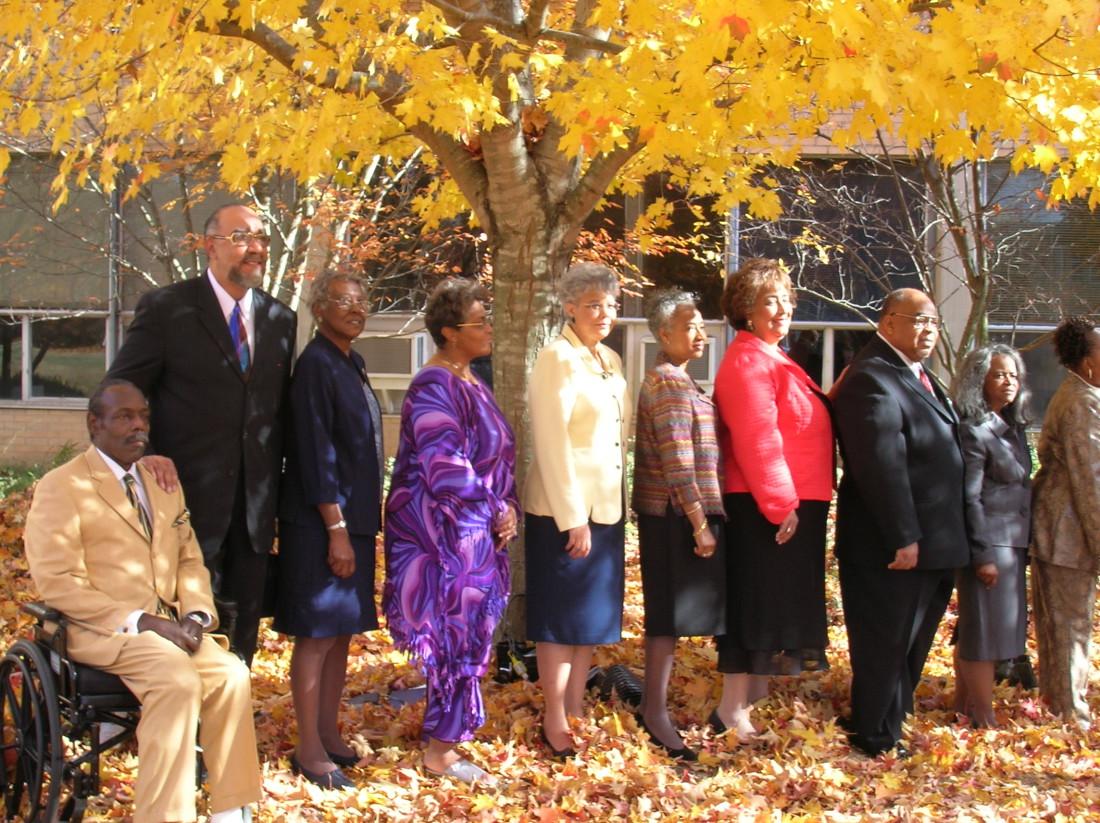In 1960, a group of student activists at Asheville’s all-black Stephens-Lee High School courageously challenged the racial status quo, bringing the civil rights movement closer to home. Through public demonstrations, boycotts and engagements with city officials, the members of the Asheville Student Committee on Racial Equality helped break down Jim Crow-era barriers.
For the past two decades, the Center for Diversity Education at UNC Asheville has carried on that legacy, striving to strengthen diversity education in the city’s public schools through exhibits, presentations and partnering with other local organizations to boost awareness of issues involving social and economic equity.
To mark its 20th anniversary, the center is hosting Building on a Legacy, a two-day celebration on the UNCA campus. It will kick off on Thursday, Nov. 5, with a reception for the surviving ASCORE members, a talk by James Ferguson (the student group’s founding chair) and a lecture by Harvard University professor Henry Louis Gates Jr. During the reception, a PowerPoint presentation will be shown that features ASCORE members’ high school photos along with images of the places they desegregated. The free event is open to the public.
A sold-out noon luncheon the next day will shift the focus to current community members who are working in that same spirit to address today’s challenges. Five people will receive the inaugural 2042 Ascore Leadership Awards; 2042 is the year when white Americans are projected to become a minority population.
“The name of the event indicates the continuum of time that exists from one generation to the next,” says longtime Executive Director Deborah Miles. “The folks who are doing the work for equity and inclusion today build on the work of ASCORE. These awardees are following in those footsteps, and others are coming up right now to build on their work. We hope this award gives them a lift and encouragement to continue this work, and a lift to the community as they serve as role models for the next generation.”
Modest roots
The Center for Diversity Education began in 1995 at the Asheville Jewish Community Center. “At first, the focus was on K-12 education, with exhibits, classroom presentations and professional development for teachers,” says Miles.
In 2003, having grown in size and scope, the organization moved to its current home on the UNCA campus, and last year, it officially became part of the university.
Over the years, notes Miles, the center has increasingly collaborated with other organizations and institutions, working with UNCA staff, faculty and students to forge connections between the classroom and community needs. “We recently completed a new exhibit on health care equity in Buncombe County,” she reports. “The research was based on the work of local health care educator Sharon West and enlarged upon by students in UNCA’s health and wellness department.”
Reviewed by community health care workers, the student-generated text is now on display at Mission Hospital; a student, says Miles, is developing an online version that will be available as a “professional development resource for community members, health and wellness majors, Mission employees and local medical practices.”
A high school revolution

Miles’ work is part of a legacy of student activism in Asheville stretching back to ASCORE’s groundbreaking campaign, she points out.
“These were some pretty remarkable high school students who saw what was happening in Greensboro in 1960 and knew that the same issues existed here.” A young, engaged group, she continues, was able to harness the ideals of the national civil rights movement to effect change in their own community.
“For instance, if a black student at Stephens-Lee needed a book for a research project, the librarian at the ‘colored library’ would send a note to Pack, and in four to five days the book would appear at the Eagle Street branch — which was often too late for the research paper,” Miles explains. “Viola Jones Spells was one of the students who met with Tony Lord to negotiate the complete opening of Pack Memorial Library to all the citizens of Asheville.”
And rather than viewing their efforts as isolated incidents, she says, ASCORE members carried that spirit into their adult lives, becoming “deeply engaged citizens” and inspiring later generations.
“That best practice is proven over and over again in research,” notes Miles. “The more early engagement young people have, the more likely it is that it becomes a lifelong habit in their professional and community aspirations.”
For the past five years, the Center for Diversity Education and several partner organizations have organized the Me2We Social Justice Conference on the UNCA campus. “The program has gone on long enough that the adults sit back and watch as the youth lead the sessions and develop a community ready to address today’s equity issues, from health care to high school tracking with standard, honors and AP classes,” she reports.
Tomorrow’s leaders
The 2042 Awards recognize community members who embody ideals gleaned from interviews with former ASCORE members — things like peer-to-peer mentoring, adult mentoring, creativity and a lifelong mission to learn — and who are working toward the goals of equality and community development today.
The five award winners are: Philip Cooper, Lucia Daugherty, Dulce Milian Rosas Porras, Samantha Singer and Yetta Williams.
Cooper, a recent A-B Tech graduate who’s mentored students in the Minority Student Leadership Academy, is a certified peer support specialist at Next Step Recovery and a recovery coach for Biltmore Transitional Housing.
Daugherty, co-founder of the Pisgah View Community Peace Garden, has worked extensively as a tutor for the “I Have A Dream” Foundation and is executive director of the Asheville-Buncombe Community Relations Council. Rosas Porras is a community organizer for Nuestro Centro and coordinates the group’s Raices program, all while working toward earning her GED diploma and pursuing higher education.
Singer, who helped create Hyannis House at UNCA, works with members of the LGBT community who’ve been sexually assaulted. And Williams, who’s taught at Hall Fletcher Elementary for 10 years, is an active participant with Building Bridges of Asheville and a 2015 Beattie Foundation award recipient.
Receiving the 2042 Award, says Williams, has left her feeling “overwhelmed and frightened. I am so incredibly honored, and I know many people helped to get me here.”

Both in the classroom and in her personal life, she notes, her work revolves around the idea of equity. In the classroom, this takes the form of regular parent information sessions and ensuring that students have access to the tutoring and support systems they need to succeed. Williams says she regularly partners with local colleges and organizations to “help pique student interest in life beyond elementary school” through field trips and other educational experiences.
“I work for an incredible school and with the most energetic, thoughtful staff, PTO and racial equity team that any school in the district could offer, and I am so very thankful for that.”
To Williams, the center’s work in carrying on ASCORE’s legacy is a sign that “people in this community have heard and are listening and are ready to keep moving forward. This award means that someone is taking notice of the great things local leaders are doing to create a more peaceful, equitable world for us all to live in.” She also credits the elders in the Building Bridges program, who’ve supported her and “all of the teachers that are working hard for the students on a daily basis.”
Teamwork
More than ever, says Miles, the Center for Diversity Education is working to strengthen its ties to community groups such as the city of Asheville’s Youth Leadership Academy, UNCA’s AVID program, Mentoring and Nurturing Our Students, the YMCA, the JCC and Everybody’s Environment.
The center’s work, she explains, “is to build relationships across different formats. The issues that were in our community in 1995 are still there, and more has been added with the growth of immigrant communities, 9/11, reassessment of gender norms, globalization and more.”
And while the 20th-anniversary celebration is a time to reflect on what the organization has accomplished up till now, Miles says center members already looking to the future. “In 2042, our nation demographically will be a majority minority nation,” she points out, adding, “We need folks who demonstrate democratic pluralism.”



Before you comment
The comments section is here to provide a platform for civil dialogue on the issues we face together as a local community. Xpress is committed to offering this platform for all voices, but when the tone of the discussion gets nasty or strays off topic, we believe many people choose not to participate. Xpress editors are determined to moderate comments to ensure a constructive interchange is maintained. All comments judged not to be in keeping with the spirit of civil discourse will be removed and repeat violators will be banned. See here for our terms of service. Thank you for being part of this effort to promote respectful discussion.